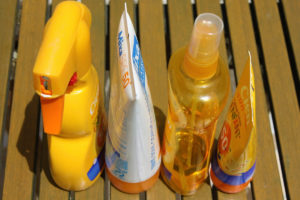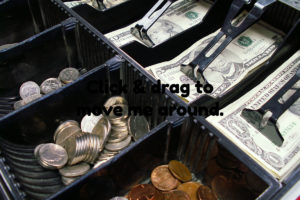 March is known for coming in like a lion and going out like a lamb. April showers bring May flowers but what in the world does May bring? May ushers in the summer sales season! Spring is wrapping up and now is the time to be getting your store ready for all of the shoppers looking for the items that will make the long, warm days of June, July and August a memorable time. The big stores are rolling out grills, picnic wares and yard games. They are loading up with tons of bathing suits, beach towels, sunscreens and sunglasses. The big boys appeal to all of the summer trends in almost every department. They are also preparing for criminal activity and preparing to prevent it.
March is known for coming in like a lion and going out like a lamb. April showers bring May flowers but what in the world does May bring? May ushers in the summer sales season! Spring is wrapping up and now is the time to be getting your store ready for all of the shoppers looking for the items that will make the long, warm days of June, July and August a memorable time. The big stores are rolling out grills, picnic wares and yard games. They are loading up with tons of bathing suits, beach towels, sunscreens and sunglasses. The big boys appeal to all of the summer trends in almost every department. They are also preparing for criminal activity and preparing to prevent it.
With the end of May families start to travel and take vacations, children and teens are out of school and so there is just more free time on people’s hands. No, I’m not advocating doing away with summer vacations from school (I remember my school days and my break times could never get here fast enough). The simple fact is that with more people coming and going into stores theft will increase as will sales. Big box retailers prepare for this influx of traffic. Store Managers are setting planograms and endcaps to encourage the sale of those items that are relevant to the tourist, vacationer and outdoor-minded families. Loss Prevention Managers are evaluating product placement and the appropriate retail anti-theft devices for the particular merchandise in question. They may also be reviewing camera coverage to ensure thieves will be discouraged from trying to steal. Electronic Article Surveillance Systems will be tested for functionality and that tagging standards are met. The small business retail owner could have to do such things on his/her own. If you are that owner you may not even think you have a store that lends itself to seasonal merchandise sales. Take a look again, you may have more items that can be season specific than you think. You may also be able to take advantage of Loss prevention measures you have not implemented yet.
If a store specializes in jewelry sales it may not occur to an owner that there is a seasonal element to it. Jewelry would seem to be a year-round item to sell but think about your merchandise in terms of accessorizing summer dresses or casual watches for a man preparing to go on a trip. Someone on a cruise may need jewelry that will accentuate an evening dress for formal dinners. How about the small corner grocer? What kind of impact can summer have in that store? Think about the traditional things we do during the summer days. We load up coolers with soft drinks and beer. We have cookouts with hot dogs, burgers, marshmallows, buns, condiments etcetera. Put the dry goods at the front of the store in high traffic areas to impact customer interest. Running a hardware store means putting lawn and garden care tools and supplies in front of the customers. Maybe you carry drink coolers or gas containers for boaters. Product placement is key to reminding customers what they need for the season.
As you begin strategizing about how the merchandise you carry can have a seasonal component you also want to think about whether those goods will be stolen. Retail merchandise anti-theft devices are available for nearly every single item that is sold. It is simply a matter of finding the correct tag or label for the item. If you are going to promote meat for summer cookouts you have to know that there are going to be shoplifters who will try to steal some of it. Using food-safe Checkpoint EAS labels will prevent pilferage while allowing you the freedom to fill your meat freezers with the items that will increase sales. Having a grill display may be an opportunity to use an Alpha Security cable lock to keep it from being rolled out the door. Condiments on that display can be protected with EAS soft tags. An end cap with bathing suits near the front of the store will drive sales and theft but clothing security tags will deter shoplifters. Jewelry store owners, you will be happy to know there are jewelry locks available to permit open-air display which can increase sales.
Be ready for summer. Sales will sizzle as the days heat up if you use May to get your merchandise in front of the shoppers. Prepare displays that will mesmerize your customers and entice them to make purchases. In the process, don’t forget to use merchandise protection strategies. Increased foot traffic does not have to mean increased theft if you protect your products with the appropriate devices.
 Holiday sales events and promotions are intended to boost retail sales. The obvious big event is the Christmas holiday season which seems to begin in October for many retailers. The event carries into January when merchandise goes clearance as retailers prepare for the next holiday event and the beginning of the Spring sales lines.
Holiday sales events and promotions are intended to boost retail sales. The obvious big event is the Christmas holiday season which seems to begin in October for many retailers. The event carries into January when merchandise goes clearance as retailers prepare for the next holiday event and the beginning of the Spring sales lines. What do you do when a crisis occurs? Many people would say they take steps to address the crisis. Initially, that may sound like a good response unless you never planned on how you would react if that crisis were to take place. Think about it for a moment. If your business was on fire would you want firemen pulling up in their cars without the right gear or a plan of action of how they will take care of the fire? Sure it’s good to have the firemen there but if they don’t have the resources they need or a strategy on how to put out a house fire then the response is pointless. Police officers train on how to respond to a bank robbery in progress but the reality is many officers will never face that situation. According to a Cleveland Clinic Survey, 54% of Americans say they know CPR but the vast majority of us will never be called upon to use that training. So why do we do it? Why do we train for circumstances that are unlikely to ever confront us? We do it so we will be prepared for that one-in-a-million chance that we might have to apply that knowledge. President John F. Kennedy once said, “The time to repair the roof is when the sun is shining.” Attempting to play it by ear should an emergency happen is not a plan and may even make a problem worse.
What do you do when a crisis occurs? Many people would say they take steps to address the crisis. Initially, that may sound like a good response unless you never planned on how you would react if that crisis were to take place. Think about it for a moment. If your business was on fire would you want firemen pulling up in their cars without the right gear or a plan of action of how they will take care of the fire? Sure it’s good to have the firemen there but if they don’t have the resources they need or a strategy on how to put out a house fire then the response is pointless. Police officers train on how to respond to a bank robbery in progress but the reality is many officers will never face that situation. According to a Cleveland Clinic Survey, 54% of Americans say they know CPR but the vast majority of us will never be called upon to use that training. So why do we do it? Why do we train for circumstances that are unlikely to ever confront us? We do it so we will be prepared for that one-in-a-million chance that we might have to apply that knowledge. President John F. Kennedy once said, “The time to repair the roof is when the sun is shining.” Attempting to play it by ear should an emergency happen is not a plan and may even make a problem worse. Recently, I conducted an employee theft investigation for a client. I want to share some of the findings from that investigation in the hopes that you can use it to review your own potential for losses.
Recently, I conducted an employee theft investigation for a client. I want to share some of the findings from that investigation in the hopes that you can use it to review your own potential for losses. 
 Sometime this year you will most likely be conducting an inventory. Some stores even conduct multiple inventories when they have high stock shortage results. While it does not necessarily translate to poor results, a lack of adequate preparation can have an impact on the final shortage numbers.
Sometime this year you will most likely be conducting an inventory. Some stores even conduct multiple inventories when they have high stock shortage results. While it does not necessarily translate to poor results, a lack of adequate preparation can have an impact on the final shortage numbers. In a recent article published in LPM Insider, “Security Footage Sinks Employee Lawsuit Targeting Employee Bag Checks” by Garrett Seivold, Feb 7, 2018, they discussed a lawsuit brought against Nike by an employee who complained that he was being required to have package checks done when he was off the clock. His argument was that he was not being compensated for the time he is delayed. For the time being Nike has not been found to be excessive in its demands. They were able to demonstrate that employees were only being stopped for an average of 18 seconds for an inspection. This is hardly excessive by any measure. However, courts have a tendency to be inconsistent or a higher court may overturn a lower court decision. While one court may uphold the decision in favor of Nike there is no guarantee this will be true should a similar lawsuit be brought against other retailers.
In a recent article published in LPM Insider, “Security Footage Sinks Employee Lawsuit Targeting Employee Bag Checks” by Garrett Seivold, Feb 7, 2018, they discussed a lawsuit brought against Nike by an employee who complained that he was being required to have package checks done when he was off the clock. His argument was that he was not being compensated for the time he is delayed. For the time being Nike has not been found to be excessive in its demands. They were able to demonstrate that employees were only being stopped for an average of 18 seconds for an inspection. This is hardly excessive by any measure. However, courts have a tendency to be inconsistent or a higher court may overturn a lower court decision. While one court may uphold the decision in favor of Nike there is no guarantee this will be true should a similar lawsuit be brought against other retailers.  Because like alcohol abuse, both legal and illegal drug use, affects your bottom line. This issue
Because like alcohol abuse, both legal and illegal drug use, affects your bottom line. This issue  I recently read an article entitled “How to spot a liar in your inbox” by Vanessa Van Edwards. The article discussed the nuances of how to tell if someone is lying to you in an email. The writer made some interesting observations on the lack of personal pronouns in the body of an email, inconsistency in tense usage and vague language. It dawned on me that often this is the same thing supervisors handle on a regular basis with employees. Think back to a phone call you have taken from an employee calling out of work. Often the conversation goes something like this, “I don’t feel well, I think I am going to have to call out today.” The employee is using language that does not make sense. They “think” they have to call out. Either they do or they don’t have to call out, the decision is theirs to make. Saying “I think” sounds more like asking permission to call out than making a decision of their own. Avoiding responsibility is one way an employee may try to lie without feeling guilty about it.
I recently read an article entitled “How to spot a liar in your inbox” by Vanessa Van Edwards. The article discussed the nuances of how to tell if someone is lying to you in an email. The writer made some interesting observations on the lack of personal pronouns in the body of an email, inconsistency in tense usage and vague language. It dawned on me that often this is the same thing supervisors handle on a regular basis with employees. Think back to a phone call you have taken from an employee calling out of work. Often the conversation goes something like this, “I don’t feel well, I think I am going to have to call out today.” The employee is using language that does not make sense. They “think” they have to call out. Either they do or they don’t have to call out, the decision is theirs to make. Saying “I think” sounds more like asking permission to call out than making a decision of their own. Avoiding responsibility is one way an employee may try to lie without feeling guilty about it.